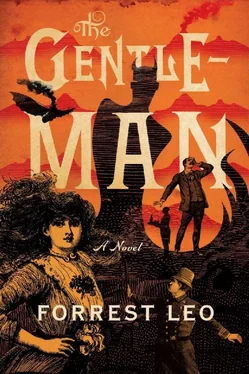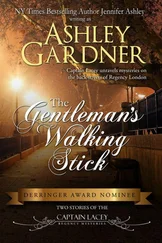‘I see, sir.’
‘You don’t know where it is, do you, Simmons?’
‘Not offhand, sir.’
‘Well damn it, Simmons, then what are we to do?’
‘It would seem, sir, that some research is in order. Might I suggest a trip to Tompkins’s?’
‘Of course!’ I cry, feeling the fool for not having thought of it myself. ‘Simmons, you’re a miracle.’
‘Thank you, sir.’
‘What’s Tompkins’s?’ says Lancaster.
‘Oh,’ says Lizzie wickedly, ‘do you find yourself ignorant upon the subject?’
‘Touché,’ grins the giant.
‘Tompkins’s,’ I say, ‘is the best bookshop in London.’
‘And probably the world,’ says Lizzie.
‘And probably the world,’ I echo.
‘A bookshop?’ says Lancaster. ‘But all the shops are closed. Simmons just said it was almost midnight!’
‘All the shops are closed, sir,’ says Simmons. ‘But not Tompkins’s shop. Tompkins’s shop is never closed.’*
Nine In Which We Are Helped by a Human Encyclopaedia
The first thing Tompkins says is, ‘You again?’ which leads to a brief account of my afternoon ramble and my encounter with Will Kensington — about whom Lizzie and Ashley are very eager to hear. They are a trifle hurt that I did not mention him before. (I did not tell them about my ramble at first because it was a private matter, and then because I was distracted by Lancaster’s fists.)
‘Do you know where he’s staying, Tompkins?’ I ask.
‘Some sort of inventors’ club, I believe. The Hefestaeum, was it? It’s in Pall Mall.’
‘I’ve never heard of it,’ I say, which I find perplexing. I make it my business to know things about this city which are odd or poetical, and an inventors’ club sounds to me like both. ‘Have you heard of it, Simmons?’
‘I have not, sir,’ says he. ‘Perhaps Tompkins invented it.’ Simmons enjoys needling his friend.*
‘ Invented it, eh?’ cackles Tompkins. ‘I’d’ve expected better of you, Simmons.’ Simmons makes him an ironic little bow. ‘Now,’ he says, ‘tell me what it is precisely that you’re doing here in the middle of the night.’
We are seated before his fire. Simmons and Lancaster and I pulled four armchairs into a semi-circle, or a sort of prostrate arch of which Tompkins is the keystone, while Lizzie poured us all tea, which we are now sipping.
‘To begin with,’ I say, ‘I realised I love my wife.’
‘Naturally,’ says Tompkins. I cannot tell if he is making fun of me or not.
‘Quite. Anyway, we obviously have to get her back—’
‘From the Devil?’
‘Yes, yes, from the Dev’l — but the trouble is, we don’t actually know how to get to Hell to talk to him.’
‘Hmm,’ says Tompkins. ‘Yes, I see. Go on.’
‘Well… That’s it, really. We need to plan an expedition to get to Hell, and in order to do that it seems we need to discover the location of Hell—’
‘If it has a location,’ puts in Lizzie.
‘Which,’ I say sternly, ‘we have agreed to assume. And so we came here to do some research.’
‘Simmons,’ says Tompkins, ‘I am pleased to see that even if they are in general quite hopeless, these children of yours do at times display some sense.’
‘Yes,’ says Simmons. ‘At times, I suppose they do. But Tompkins, it would be well if you and I—’
Simmons is speaking out of turn, and I cut him off. He seems less than enthusiastic about our adventure, and it bothers me. ‘Can you help us?’ I demand of the bookseller.
Tompkins pulls at his moustache, which is a very fine one (by ‘fine’ I do not mean that it is thin but just the opposite) and is shaped like the business end of a push broom. ‘Perhaps I can,’ says he. ‘I do not know. One never really does. But I am willing to try.’
‘Tompkins,’ says Simmons, ‘you and I really must talk.’
Tompkins opens his mouth to reply to his friend, but I silence him with a look. Simmons is behaving in a most un-Simmons-like manner. He and I must have words. ‘Simmons,’ I say, ‘are you or are you not committed to rescuing Vivien?’
He looks me in the eye. ‘I am utterly committed to rescuing Mrs Savage, sir,’ he says.
‘Good,’ I say. ‘Then let’s get started.’ And I put the queer matter of Simmons’s mutiny out of my mind. I turn to Tompkins and say, ‘Lizzie and I are heathens and Lancaster’s a Buddhist, so we’re at quite a loss. Did you know Buddhism hasn’t got a hell?‘
‘Now wait a bit,’ says Lancaster. ‘I never said that.’
‘It does, then?’ I demand. ‘Did you not think that relevant information?’
‘Not particularly,’ he says. ‘There are several hells called naraka, but they’re individual and impermanent hells, really more like purgatories. They appear when you die and when you’ve worked off your debt, as it were, they disappear. In other words, they—’
‘Have no physical location?’ says Lizzie.
‘Well… no.’
‘This isn’t helping!’ I say. ‘We need help!’
‘What books shall we begin with?’ asks Lancaster, looking unhappy but stoic. It occurs to me with a shock that he may not like books. I dismiss the thought as soon as it enters my head as too preposterous to be borne. Not like books! I cannot believe it of a fellow man.
‘No, silly,’ says Lizzie. ‘We don’t start with books — we start with Tompkins!’
Which is of course the truth.
The bookseller sits in silence for a time. I can practically hear the encyclopaedia pages of his mind turning. Then he begins. ‘The notion of an underworld has been around since the beginning of recorded history. Somewhere souls go when the bodies they occupy die. Nearly every religion has some version of it. In Indo-European cults—’
‘Tompkins,’ I cry, ‘we don’t need an anthropology lesson! Give us something useful.’
He sighs and I imagine I can hear a few more encyclopaedia pages turn. ‘Between the Crucifixion and Resurrection, it is believed Jesus led a successful military raid upon Hell — which at that time was not actually called Hell, but, rather—
‘Essex Grove?’ I say eagerly. All eyes swivel toward me and I feel myself blush.
‘… No,’ says Tompkins. ‘Not Essex Grove. It was called Sheol. It was the Old Testament underworld to which the souls of all dead, both righteous and unrighteous, went. The purpose of this raid, which mediaeval theologians dubbed the Harrowing, was to free the righteous and escort them to Paradise.’
‘That’s interesting,’ says Lizzie, leaning forward.
‘Yes, interesting,’ I say without enthusiasm, ‘but still useless.’
‘It’s not useless,’ says Tompkins. ‘It is an example of the many stories in which a living man physically visits the realm of the dead. The Orpheus myth is another — as is the tale of Sir Orfeo, which was not his real name at all. The point being that it is possible. Which is an excellent place to begin.’
‘Hear, hear,’ says Lancaster.
‘But how do we get there?’ I demand.
‘I’m thinking,’ Tompkins barks. The thing about Tompkins, you see, is that he has so much information crammed in his head that it sometimes takes him a while to unearth the precise piece he is searching for. ‘Well,’ he says after a moment, ‘there is of course a reason it is referred to as the “ under world.” It is generally supposed to be within the earth, probably somewhere near its centre.’
‘But that’s impossible,’ I say, exasperated. ‘It’s unscientifical.’
‘I’m sorry,’ says Tompkins blandly, ‘I thought you said you’d sold your wife to the Devil.’
Читать дальше












